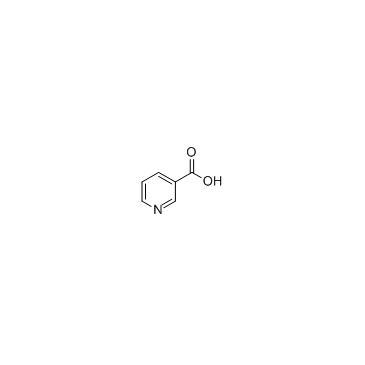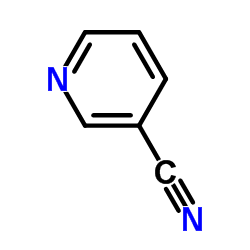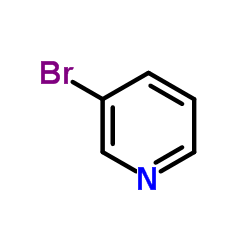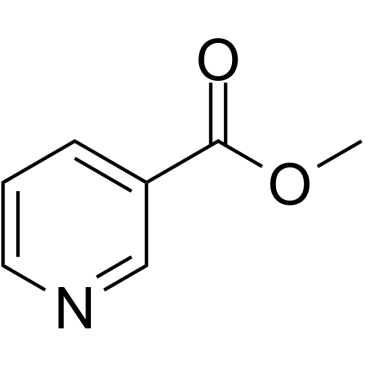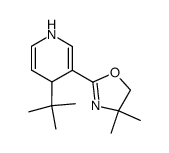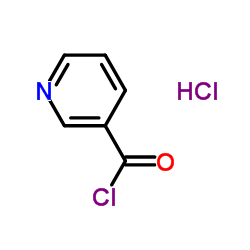68981-86-2
| Name | 4,4-dimethyl-2-pyridin-3-yl-5H-1,3-oxazole |
|---|---|
| Synonyms |
4,5-Dihydro-4,4-dimethyl-2-(pyrid-3-yl)oxazole
3-(4,4-dimethyl-4,5-dihydro-oxazol-2-yl)-pyridine 4,5-Dihydro-4,4-dimethyl-2-(3-pyridyl)oxazole 4,4-dimethyl-2-(3-pyridyl)-1,3-oxazoline 3-(4,5-dihydro-4,4-dimethyl-2-oxazolyl)pyridine 4,4-Dimethyl-2-(3-pyridyl)-oxazoline MFCD01313220 |
| Density | 1.12 g/cm3 |
|---|---|
| Boiling Point | 284.7ºC at 760 mmHg |
| Molecular Formula | C10H12N2O |
| Molecular Weight | 176.21500 |
| Flash Point | 126ºC |
| Exact Mass | 176.09500 |
| PSA | 34.48000 |
| LogP | 1.07260 |
| Index of Refraction | 1.569 |
Synonym:4,5-Dihydro-4,4-dimethyl-2-(3-pyridyl)oxazol Section 2 - COMPOSITION, INFORMATION ON INGREDIENTS
Risk Phrases: None Listed. Section 3 - HAZARDS IDENTIFICATION EMERGENCY OVERVIEW
Not available. Potential Health Effects Eye: May cause eye irritation. Skin: May cause skin irritation. May be harmful if absorbed through the skin. Ingestion: May cause irritation of the digestive tract. May be harmful if swallowed. Inhalation: May cause respiratory tract irritation. May be harmful if inhaled. Chronic: Not available. Section 4 - FIRST AID MEASURES Eyes: Flush eyes with plenty of water for at least 15 minutes, occasionally lifting the upper and lower eyelids. Get medical aid. Skin: Get medical aid. Flush skin with plenty of water for at least 15 minutes while removing contaminated clothing and shoes. Ingestion: Get medical aid. Wash mouth out with water. Inhalation: Remove from exposure and move to fresh air immediately. Notes to Physician: Treat symptomatically and supportively. Section 5 - FIRE FIGHTING MEASURES General Information: As in any fire, wear a self-contained breathing apparatus in pressure-demand, MSHA/NIOSH (approved or equivalent), and full protective gear. Extinguishing Media: Use water spray, dry chemical, carbon dioxide, or chemical foam. Section 6 - ACCIDENTAL RELEASE MEASURES General Information: Use proper personal protective equipment as indicated in Section 8. Spills/Leaks: Vacuum or sweep up material and place into a suitable disposal container. Section 7 - HANDLING and STORAGE Handling: Avoid breathing dust, vapor, mist, or gas. Avoid contact with skin and eyes. Storage: Store in a cool, dry place. Store in a tightly closed container. Section 8 - EXPOSURE CONTROLS, PERSONAL PROTECTION Engineering Controls: Use adequate ventilation to keep airborne concentrations low. Exposure Limits CAS# 68981-86-2: Personal Protective Equipment Eyes: Not available. Skin: Wear appropriate protective gloves to prevent skin exposure. Clothing: Wear appropriate protective clothing to prevent skin exposure. Respirators: Follow the OSHA respirator regulations found in 29 CFR 1910.134 or European Standard EN 149. Use a NIOSH/MSHA or European Standard EN 149 approved respirator if exposure limits are exceeded or if irritation or other symptoms are experienced. Section 9 - PHYSICAL AND CHEMICAL PROPERTIES Physical State: Solid Color: Not available. Odor: Not available. pH: Not available. Vapor Pressure: Not available. Viscosity: Not available. Boiling Point: Not available. Freezing/Melting Point: Not available. Autoignition Temperature: Not available. Flash Point: Not available. Explosion Limits, lower: Not available. Explosion Limits, upper: Not available. Decomposition Temperature: Solubility in water: Specific Gravity/Density: Molecular Formula: C10H12N2O Molecular Weight: 176 Section 10 - STABILITY AND REACTIVITY Chemical Stability: Not available. Conditions to Avoid: Incompatible materials. Incompatibilities with Other Materials: Oxidizing agents, reducing agents. Hazardous Decomposition Products: Nitrogen oxides, carbon monoxide, carbon dioxide. Hazardous Polymerization: Has not been reported Section 11 - TOXICOLOGICAL INFORMATION RTECS#: CAS# 68981-86-2 unlisted. LD50/LC50: Not available. Carcinogenicity: 3-(4,4-Dimethyl-4,5-dihydro-1,3-oxazol-2-yl)pyridine - Not listed by ACGIH, IARC, or NTP. Section 12 - ECOLOGICAL INFORMATION Section 13 - DISPOSAL CONSIDERATIONS Dispose of in a manner consistent with federal, state, and local regulations. Section 14 - TRANSPORT INFORMATION IATA No information available. IMO No information available. RID/ADR No information available. Section 15 - REGULATORY INFORMATION European/International Regulations European Labeling in Accordance with EC Directives Hazard Symbols: Not available. Risk Phrases: Safety Phrases: S 24/25 Avoid contact with skin and eyes. WGK (Water Danger/Protection) CAS# 68981-86-2: No information available. Canada None of the chemicals in this product are listed on the DSL/NDSL list. CAS# 68981-86-2 is not listed on Canada's Ingredient Disclosure List. US FEDERAL TSCA CAS# 68981-86-2 is not listed on the TSCA inventory. It is for research and development use only. SECTION 16 - ADDITIONAL INFORMATION N/A |
|
~75% 
68981-86-2 |
| Literature: Vorbruggen; Krolikiewicz Tetrahedron, 1993 , vol. 49, # 41 p. 9353 - 9372 |
|
~92% 
68981-86-2 |
| Literature: Jnaneshwara; Deshpande; Lalithambika; Ravindranathan; Bedekar Tetrahedron Letters, 1998 , vol. 39, # 5-6 p. 459 - 462 |
|
~% 
68981-86-2 |
| Literature: Tetrahedron Letters, , vol. 27, # 43 p. 5269 - 5270 |
|
~% 
68981-86-2 |
| Literature: Tetrahedron Letters, , vol. 27, # 43 p. 5269 - 5270 |
|
~77% 
68981-86-2 |
| Literature: Hauck, Albert E.; Giam, Choo-Seng Journal of the Chemical Society, Perkin Transactions 1: Organic and Bio-Organic Chemistry (1972-1999), 1980 , p. 2070 - 2076 |
|
~% 
68981-86-2 |
| Literature: Journal of Organic Chemistry, , vol. 47, # 13 p. 2633 - 2637 |
|
~27% 
68981-86-2 |
| Literature: Journal of the Chemical Society, Perkin Transactions 1: Organic and Bio-Organic Chemistry (1972-1999), , p. 2070 - 2076 |
|
~% 
68981-86-2 |
| Literature: Journal of Organic Chemistry, , vol. 47, # 13 p. 2633 - 2637 |
|
~% 
68981-86-2 |
| Literature: Synthesis, , # 8 p. 693 - 696 |
| HS Code | 2934999090 |
|---|---|
| Summary | 2934999090. other heterocyclic compounds. VAT:17.0%. Tax rebate rate:13.0%. . MFN tariff:6.5%. General tariff:20.0% |
